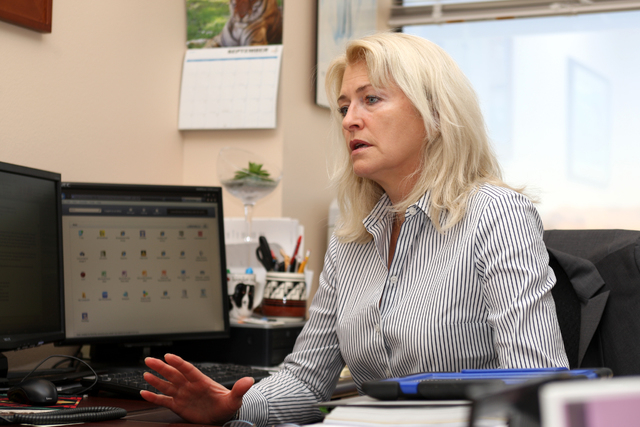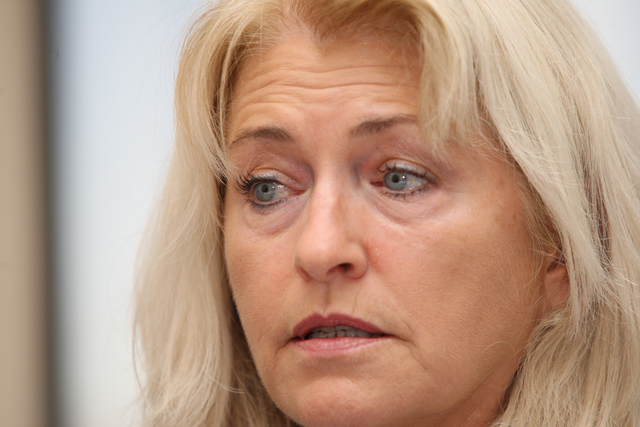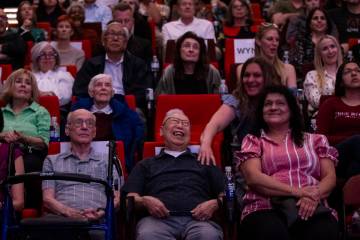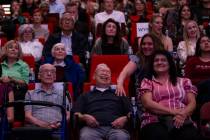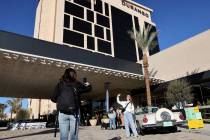Guilty conscience brings confession in skinhead murder case
It was a hot day in 2011 when Danny Hartung walked into the U.S. attorney’s office in downtown Las Vegas.
He asked to speak with prosecutor Kathleen Bliss.
“I knew that there was going to be something big, just because of the way he looked,” Bliss recalled.
Realizing that Hartung wanted to talk about two 1998 shooting deaths linked to neo-Nazi skinheads, and that he was planning to incriminate himself, Bliss quickly signed him up for a court-appointed lawyer.
Bliss remembers worrying about the heat that day as she walked Hartung to his new lawyer’s office in the Bank of America building, two blocks away. She was worried because Hartung was red-faced and smoking nervously.
While she no longer remembers the exact date — she had to leave all the records behind when she quit her government job in August 2012 — Bliss can’t forget other details of that day or of the events that followed.
That’s because the veteran prosecutor soon found herself at the office of defense attorney Karen Winckler, where Hartung confessed.
At one point during the meeting, attended by the two lawyers and an FBI agent, Bliss thought Hartung was going to vomit.
“I’ve never seen anyone who was so viscerally purging himself of the evil that he had become overwhelmed with,” the former prosecutor said.
Bliss considered it a turning point in the cold case, which federal authorities had been actively investigating.
The lawyer, now in private practice, recounted the details of Hartung’s confession Friday at her southwest Las Vegas office.
A day earlier, a federal jury acquitted two other suspects in the murder case. But the jury never heard from Hartung, because he died in a traffic accident in April 2012. He was 36.
“Danny’s statements could not come in because the defendants would not have been able to enjoy their constitutional right to cross-examine him,” Bliss explained.
During the trial, lawyers with the Justice Department’s Civil Rights Division argued that defendants Ross Hack, 42, and Leland Jones, 33, had gotten away with murder for 16 years. Defense lawyers pointed to a lack of physical evidence, and both defendants were acquitted.
The prosecution relied heavily on testimony from three people who admitted participating in the murder plot: John “Polar Bear” Butler, Mandie Abels and Melissa Hack.
Bliss said Hartung, Ross Hack’s former roommate, had agreed to plead guilty to a conspiracy charge and testify at the trial.
The case stemmed from the execution-style shooting deaths of Lin “Spit” Newborn, 25, and Daniel Shersty, 20, who were ambushed in a desert area of northwest Las Vegas in the early-morning hours of July 4, 1998.
Authorities said the victims were killed because they were members of a skinhead group that opposed racial prejudice. Newborn was black, and Shersty was white.
Butler, once the president of the Independent Nazi Skins, was convicted of both murders in 2000 in Clark County District Court. Prosecutors always believed others participated, but they lacked the evidence to charge them until some of the suspects began sharing information.
Bliss said federal investigators got involved after realizing that the crimes occurred on federal land. She said they first persuaded Abels, Ross Hack’s former girlfriend, to cooperate.
“There’s no way Danny could have known that,” Bliss said.
She said federal authorities never approached Hartung, although they had talked to his brother.
Bliss said Hartung, then a Utah resident, had a job and a family when he decided to come forward. According to his obituary, he was survived by a wife and two children.
“Danny just had, well, he had a perfect little life going,” Bliss said.
When Hartung started talking about the murders, Bliss said, “you could see in his face that he was visualizing every single thing that happened.”
His story matched the information authorities already had, but he also provided new details.
“Danny was very intelligent, very articulate,” Bliss said.
And unlike Abels, he had no history of drug abuse.
Hartung, who had an assault rifle at the time of the shootings, denied pulling the trigger.
“He said he never fired it and that he shoved Shersty with it as Shersty was dying,” Bliss said.
He also talked about the emotional difficulties he experienced after participating in the crimes. He stayed in Las Vegas for a while, then started driving, she said. “He was just circling the drain, so to speak,” the lawyer said.
She said Hartung pulled over to the side of the road at one point and intended to shoot himself, but someone stopped to check on him and interrupted his suicide plan.
Hartung ended up in Utah, and “that’s where he started a new life,” Bliss said.
She said Hartung had discussed his involvement in the murders with his family before confessing. During his confession, he told the story of his father, Kenneth, a Drug Enforcement Administration agent who had been charged in an illegal wiretapping case.
Bliss said Kenneth Hartung pleaded guilty and cooperated in the Nevada case. Records show that he was sentenced to probation in 1986 and was pardoned by President Bill Clinton in 2000.
Danny Hartung was ashamed of his role in the 1998 killings, Bliss said, and had come to recognize that his racist beliefs were wrong.
“I’ve never had a cooperator exhibit such remorse and distress over something he had done,” Bliss said.
A federal grand jury indicted Ross Hack, his sister Melissa Hack and Jones in February 2012, the same month Abels secretly pleaded guilty to conspiracy to commit murder.
Melissa Hack pleaded guilty to the conspiracy charge in May. She and Abels said they lured the victims to the desert where they were killed. The victims were expecting to party.
Ryan Hartung, who testified during the federal murder trial, said he once talked with Jones about the 1998 shooting deaths, and Jones admitted his involvement.
“He told me that he shot a guy in the face,” Ryan Hartung said.
The witness said he and his brother were former members of the Hammerskin Nation, an international skinhead organization.
The Anti-Defamation League’s website describes the Hammerskin Nation as “the most violent and best-organized neo-Nazi skinhead group in the United States.”
Ryan Hartung recalled reading a newspaper article in July 1998 about a member of a group known as SHARP, or Skinheads Against Racial Prejudice, who had been shot in the desert.
He said he talked to Jones after reading the article, and Jones told him he had shot the “white dude” mentioned in the article. Ryan Hartung said he also learned that his brother “had come up and hit the dude with something.”
In addition, Ryan Hartung testified, Jones told him that Ross Hack and Butler had killed a “black dude.”
The witness said he never asked his brother about the incident.
“He wouldn’t just go around talking about something like that,” Ryan Hartung said.
But Danny Hartung had found the courage to talk about his crimes, Bliss said. She just doesn’t know whether his testimony would have made a difference at the trial.
“I can tell you one thing: Danny Hartung is resting in peace, because he got rid of that horrible secret,” she said.
Contact reporter Carri Geer Thevenot at cgeer@reviewjournal.com. Find her on Twitter: @CarriGeer.



